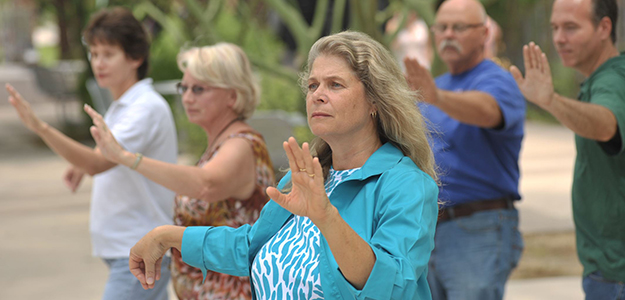 According to the National Council on Aging, one-quarter of Americans age 65 and over fall each year. That translates to an older adult seeking treatment in an emergency room for a fall every 11 seconds.
According to the National Council on Aging, one-quarter of Americans age 65 and over fall each year. That translates to an older adult seeking treatment in an emergency room for a fall every 11 seconds.
The financial toll for such accidents is expected to increase to $67.7 billion by 2020, as the health-care industry seeks to provide  cost-effective, competent care to an aging demographic. A new research study at the University of Arizona College of Nursing by Ruth Taylor-Piliae, PhD, RN, FAHA, looks to allay this crisis with a $10,000 grant from the Arizona Area Health Education Center (AzAHEC).
cost-effective, competent care to an aging demographic. A new research study at the University of Arizona College of Nursing by Ruth Taylor-Piliae, PhD, RN, FAHA, looks to allay this crisis with a $10,000 grant from the Arizona Area Health Education Center (AzAHEC).
Dr. Taylor-Pilaie—a Robert Wood Johnson Foundation Nurse Faculty Scholar and member of the UA Center on Aging—will determine if adding a low-cost balance exercise program to “A Matter of Balance" (MOB)(link is external), a nationwide eight-week structured group intervention that emphasizes practical strategies to reduce fear of falling and increase activity levels, will help prevent falls.
“The curriculum for ‘A Matter of Balance’ is designed for managing older adults’ concerns about fear of falling and what to do if they fall, such as how to get up safely from the floor,” she said. “But they don’t do specific exercises to help an older adult improve their balance.”
 That’s where Dr. Taylor-Piliae’s study comes in. Her team, members of the UA Center on Aging, includes center associate director M. Jane Mohler, RN, MSN, MPH, PhD (right), associate professor, UA College of Medicine – Tucson (Geriatrics) and UA Mel and Enid Zuckerman College of Public Health, and Nima Toosizadah, PhD, assistant professor, UA College of Medicine –Tucson and Biomedical Engineering, will integrate its Dual-Task Balance Challenge (DTBC) intervention into the program. Designed to strengthen study participants’ sense of balance, the DTBC involves a series of ankle-reaching tasks that are both physically and cognitively challenging. Dr. Toosizadah is also a Healthy Brain Research Network Aging and Cognition Scholar at the center.
That’s where Dr. Taylor-Piliae’s study comes in. Her team, members of the UA Center on Aging, includes center associate director M. Jane Mohler, RN, MSN, MPH, PhD (right), associate professor, UA College of Medicine – Tucson (Geriatrics) and UA Mel and Enid Zuckerman College of Public Health, and Nima Toosizadah, PhD, assistant professor, UA College of Medicine –Tucson and Biomedical Engineering, will integrate its Dual-Task Balance Challenge (DTBC) intervention into the program. Designed to strengthen study participants’ sense of balance, the DTBC involves a series of ankle-reaching tasks that are both physically and cognitively challenging. Dr. Toosizadah is also a Healthy Brain Research Network Aging and Cognition Scholar at the center.
Partnering with El Rio Community Health Center(link is external), a non-profit organization dedicated to providing compassionate care to underserved populations, the study will enroll 24 community-dwelling older adults (60 years and older) who are at high fall risk. A 15-minute DTBC regimen (twice a week for four weeks) will be added to the participants’ MOB training regimen. “By adding this very simple low-tech intervention to the existing curriculum, we hope to enhance both balance and attention and thus reduce the risk of falling,” said Dr. Taylor-Piliae.
“If we find that adding this intervention to the existing MOB improves people’s balance, then we can test it further by seeking federal funding to test this on a wider scale,” said Dr. Taylor-Piliae. The ultimate goal would be to integrate the Dual-Task Balance Challenge intervention into the MOB nationwide program. She points out that research doesn’t necessarily have to be high-tech to be innovative. In fact, the challenge’s low-tech structure makes it easy to be widely and quickly disseminated to MOB’s network of volunteer leaders and master trainers.
A member of the Executive Leadership Council for the statewide Arizona Falls Prevention Coalition(link is external), Dr. Taylor-Piliae has a long-standing interest in fall prevention. In her last research project, she examined the effects of Tai Chi exercise on physical function, fall rates and quality of life among older stroke survivors. She garnered evidence that participants in the Tai Chi group had significantly fewer falls after the intervention. “My long-term research goal is to enhance community-based programs with readily accessible evidence-based solutions for preventing falls,” she said.
About Arizona Area Health Education Center
The mission of Arizona AHEC is to enhance access to quality health care, particularly primary and preventive care, by improving the supply and distribution of health-care professionals through academic-community educational partnerships in rural and urban medically underserved areas. Arizona's first regional AHEC center opened in Nogales in 1984. Today, five regional centers are serving Arizona by supporting health professions education, providing continuing education for health professionals and addressing health disparities and local health workforce issues. AzAHEC programs support development of children, health professions students and health professions workforce, as well as recruitment and retention of a highly skilled health professions workforce. The regional centers also support many health careers programs, including students in medicine (both allopathic and osteopathic medical students), nursing, pharmacy, public health, dentistry and allied health. For more, see: http://azahec.uahs.arizona.edu/
ALSO SEE:
"Dr. Ruth Taylor-Piliae Awarded Grant to Study Older Adult Fall Prevention" | (UAHS Office of Public Affairs) Posted April 18, 2017
“UA Researchers Receive $1.5 Million NIH Grant to Develop Mobile, Wearable Technology to Assess Frailty” | Posted July 15, 2015

